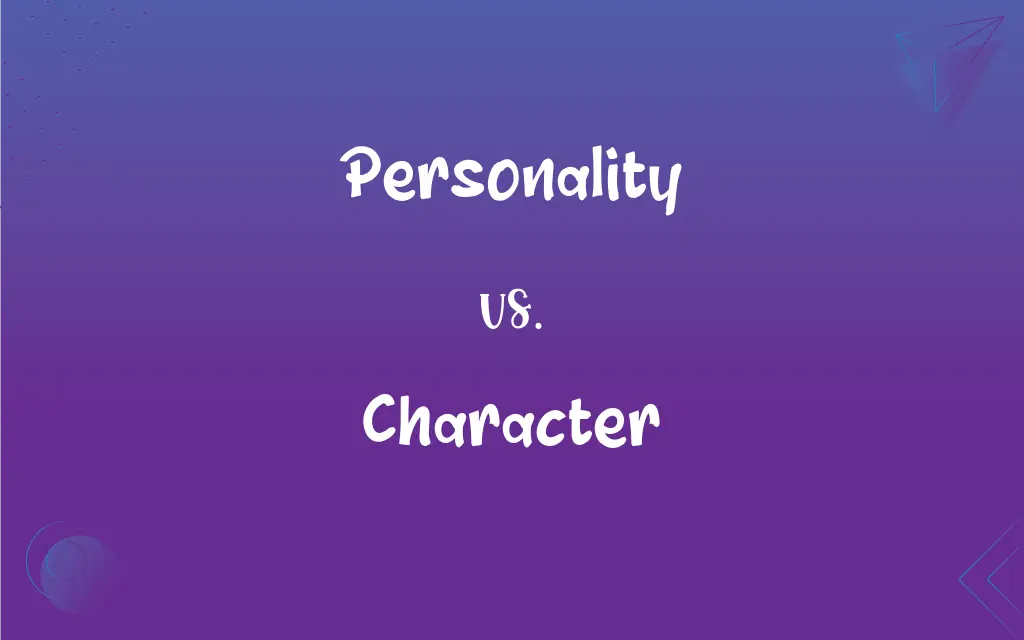Personality vs. Character: What's the Difference?
Edited by Aimie Carlson || By Harlon Moss || Updated on October 23, 2023
Personality refers to outward behaviors and traits, while character is about one's core values and moral attributes.

Key Differences
Personality encompasses the patterns of behavior, feelings, and thoughts that differentiate one individual from another. It's the vibrant and dynamic aspect of an individual, often being the first thing noticed in social contexts. Character, in contrast, delves deeper into an individual's moral and ethical traits, symbolizing the essence of who someone truly is at their core.
Personality often manifests as the combination of qualities and characteristics exhibited in an individual's interactions with the world. It's shaped by both innate characteristics and experiences over time. Character, on the other hand, embodies one's moral fiber, shaped by beliefs, values, and principles that remain mostly consistent throughout life.
Personality can be adaptable and is often influenced by external factors like environment, culture, and experiences. It's what we project and how we're perceived in various scenarios. Character, however, remains mostly steadfast, serving as an internal compass guiding decisions, actions, and how one relates to others.
The difference between personality and character can be likened to the difference between weather and climate. Personality is similar to daily weather fluctuations – ever-changing and observable. Character represents the long-term climate – the enduring qualities that stand the test of time.
Comparison Chart
Nature
Dynamic and can change.
Steadfast and consistent.
ADVERTISEMENT
Manifestation
Outward behaviors and interactions.
Core values and moral attributes.
Influence
Shaped by experiences and environment.
Shaped by beliefs, principles, and values.
Visibility
Often immediately observable.
Revealed over time and in consistent actions.
Consistency
Can vary based on situation.
Remains mostly unchanged across situations.
Personality and Character Definitions
Personality
The visible traits and behaviors an individual displays.
With such a strong personality, she often takes the lead.
ADVERTISEMENT
Character
The foundational qualities that dictate one's decisions and actions.
His actions spoke volumes about his noble character.
Personality
The sum of qualities that make an individual distinct.
His quirky personality always brings a fresh perspective.
Character
An individual's set of emotional and ethical traits.
She's known for her strong character and integrity.
Personality
The external projection of an individual's character.
Despite challenges, his positive personality never wanes.
Character
The deep-seated attributes that make up one's moral identity.
In times of crisis, true character is revealed.
Personality
The unique patterns of behavior, thought, and emotion that define an individual.
Her bubbly personality makes her the life of every party.
Character
The mental and moral qualities distinctive to an individual.
His character is evident in his consistent honesty.
Personality
A combination of characteristics that form an individual's distinctive character.
His calm personality soothes those around him.
Character
The sum of virtues, values, and beliefs held by an individual.
People admire her for her impeccable character.
Personality
The totality of qualities and traits, as of character or behavior, that are peculiar to a specific person.
Character
The combination of mental characteristics and behavior that distinguishes a person or group.
FAQs
What's the connection between character and morality?
Character often encompasses one's moral and ethical beliefs and actions.
Is character linked to integrity?
Yes, integrity is often seen as a fundamental component of good character.
How do upbringing and environment shape character?
They provide experiences, instill values, and set standards that influence character development.
Is character innate or developed?
Character can be both innate and shaped by experiences and upbringing.
Can personality change over time?
Yes, personality can evolve based on experiences, environment, and age.
How can one improve their character?
Character can be nurtured by practicing virtues, reflecting on values, and learning from experiences.
Why do people have different personalities?
Differences arise from genetics, upbringing, culture, experiences, and individual choices.
Can situations alter one's personality temporarily?
Yes, stress, joy, or other factors can cause temporary changes in personality.
Can character be judged from a single action?
While actions can provide insights, true character is usually revealed over time and consistent behaviors.
Is personality disorder related to personality traits?
Personality disorders involve rigid, unhealthy patterns of thinking and behavior.
Are there universal traits of good character?
Traits like honesty, integrity, and empathy are often seen as universal indicators of good character.
Can adversity reveal character?
Yes, challenging times often provide insights into an individual's true character.
What is the significance of strong character in leadership?
Leaders with strong character inspire trust, foster integrity, and guide with principles.
Can one's character and personality contradict each other?
While unusual, external behaviors (personality) might sometimes not align with internal values (character).
Is personality the same as temperament?
No, temperament is an innate behavior style, while personality is broader and shaped by various factors.
What forms the foundation of character?
Core values, beliefs, and moral principles form the foundation of character.
How do personality tests work?
They assess individual traits and behaviors to categorize personality types.
How does culture influence personality?
Culture shapes values, behaviors, and interactions, influencing personality development.
Do genetics play a role in personality?
Genetics can influence basic temperament, which can be a foundation for personality.
What primarily influences personality?
Personality is influenced by both genetics and environmental factors.
About Author
Written by
Harlon MossHarlon is a seasoned quality moderator and accomplished content writer for Difference Wiki. An alumnus of the prestigious University of California, he earned his degree in Computer Science. Leveraging his academic background, Harlon brings a meticulous and informed perspective to his work, ensuring content accuracy and excellence.
Edited by
Aimie CarlsonAimie Carlson, holding a master's degree in English literature, is a fervent English language enthusiast. She lends her writing talents to Difference Wiki, a prominent website that specializes in comparisons, offering readers insightful analyses that both captivate and inform.
































































